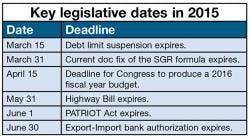Former Kentucky Congressman Geoff Davis believes we should think of Washington, DC, as a factory or a type of supply chain.
“Congress is the production facility,” he said. “The agency community develops the regulations and carries out supposedly the will of Congress, forgetting some of the constitutional discussions we could have. That’s the supply chain. When you view it that way, your involvement in making things happen has a huge impact on the law.
In “Politics, What Does It All Mean?” Davis—now the managing partner of Republic Consulting LLC—outlined what’s happening in the political environment.
Here’s what to look for in the 114th Congress:
• The Inevitable Calculus. “There are 218 votes in the House (to get a majority), 60 votes in the Senate and a President who will sign a bill. Why is it important? We were this close with the tax deal in November until President Obama killed it. Those numbers are always there.”
• Internal management issues within caucuses … getting to YES. “We had 28 votes in the Republican Party that we can lose and the House runs differently than the Senate. It runs by majority rule. In the Senate, one person can slow the whole world down. Managing those votes internally becomes a critical piece.”
• Both parties must demonstrate the ability to govern effectively.
• Likely smaller reaches due to political constraints.
He said there are three big problems for business:
• Regulation.
“It’s about 12% of GDP,” he said. “Regulations have grown simply because of the abdication of the legislative branch to the executive branch, where laws are vague and overly simplified. Congress isn’t effectively able, or willing, to exercise its oversight.
“In 2014, the Obama Administration approved regulations leading to $181.5 billion in regulatory costs. There are nearly 80,000 pages of new regulations—50% more economically significant regulations than approved under President George W Bush. The White House and Republicans are likely to battle over trucking, safety, and labor regulations.”
• Litigation.
“Congress is likely to move forward on litigation issues in 2015. Tort reform could become an issue this
year, including the reintroduction of the Lawsuit Abuse Reduction Act. Patent reform is expected to heat up
again this year to reduce the use of patent trolls. The biggest challenge is the wide range of opinions.”
• Taxation.
“Republicans are looking to advance tax-reform legislation. A permanent fix to tax extenders could
come in a reform bill but may again be temporarily extended by the end of the year. The big issues in tax reform debate are reducing the corporate rate, repatriation of foreign profits, and transitioning to a territorial tax system.”
On the transportation front, the Highway Bill expires on May 31, and there’s broad agreement on the structure of a new bill, he said.
On the trade front, several free trade treaties could come before the Senate this Congress, including the Transatlantic Trade and Investment Partnership: US-EU Nations and the Trans Pacific Partnership: US-Pacific Rim Nations.
Why is it important for companies to participate in the process?
“The more companies focus on advocacy the way they would on pursuing markets, the lower their effective tax rates and the higher their stock returns compared with competitors, according to recent research. A company called Strategas has built an index to track the stock performance of the 50 companies that advocate the most. Last year, that index outperformed the rest of the market by 30 percent.”
Or, in the words of Rep John Shimkus (R-IL): “If you want to make policy, you have to show up.”
About the Author
Rick Weber
Associate Editor
Rick Weber has been an associate editor for Trailer/Body Builders since February 2000. A national award-winning sportswriter, he covered the Miami Dolphins for the Fort Myers News-Press following service with publications in California and Australia. He is a graduate of Penn State University.



